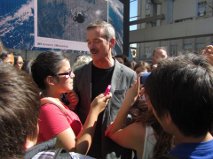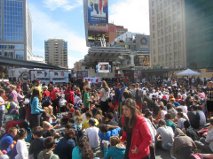
Thousands of middle-school students converged on Yonge-Dundas Square in downtown Toronto on Wednesday to celebrate Freedom Day.
The annual event was hosted by the Simon Wiesenthal Center for Holocaust Studies.
Speakers ranged from holocaust survivor Max Eisen to dance troupe SolePower, and culminated in an inspirational speech from former Canadian astronaut Chris Hadfield.
Max Eisen talked about surviving a concentration camp.
“When I was in Auschwitz, trying to survive on 300 calories a day,” he said, “I thought of two things: food and freedom.”
The downtown square was packed with students, who sat cross-legged under a blazing sun, shoulder to shoulder, to listen to the speakers.
“We need to preserve (Canada’s) values of democracy and freedom,” said Avi Benlolo, president and CEO of the Wiesenthal Centre. “You need to think about what you can do to make the world a better place. That is the core message of today.”
But it was former astronaut Chris Hadfield who caused the most excitement with the students in the crowd.

They listened intently as he told them that, despite the horrible things that may have happened on Earth—such as the holocaust and war—the Earth remains beautiful from space. From space, you can’t see borders, he said.
He also talked to the children about how they can do small things to help them achieve their dreams.
“How are you going to turn yourself into the person you want to be?” he asked. “It’s little decisions. What food do you want to eat today? Do you exercise your body? Do you get a little bit fatter or a little bit stronger today?
“What books do you read? What TV shows do you watch? Little tiny decisions are the ones that turn you into who you wake up as tomorrow morning. And the morning after that. And the week after that. And before you know it, you have pushed yourself closer to your own dreams.”
CURRICULUM CONNECTIONS
By Jonathan Tilly
Writing/Discussion Prompt
Chris Hadfield wants students to consider the small choices they make and the impact that they have. Do you agree with him–that it is better to focus on smaller decisions? Or do you think that focusing on big choices is more important to becoming the best person you can be? Be sure to support your answer.
Reading Prompt: Extending Understanding
Thousands of students celebrated Freedom Day in downtown Toronto. Write three definitions of what it means to be free. According to your definitions, are you free? Why or why not.
How often do you reflect on your freedoms? How can thinking about freedom improve your life and the lives of those in your family and community?
Primary
Express personal opinions about ideas presented in texts (OME, Reading: 1.6).
Junior
Extend understanding of texts by con- necting the ideas in them to their own knowledge, experience, and insights, to other familiar texts, and to the world around them (OME, Reading: 1.6).
Intermediate
Extend understanding of texts, including increasingly complex or difficult texts, by connecting the ideas in them to their own knowledge, experience, and insights, to other familiar texts, and to the world around them (OME, Reading: 1.6).
Grammar Feature: Quotation Marks ( ” )
Today’s article contains many direct quotes (exact speech). To show this, authors place quotation marks on either side of the speech. One common mistake that many writers make it where they place punctuation marks when using them alongside a quote. The answer is, punctuation marks such as periods and comas, always go inside the final quotation mark. For example, the following sentence from today’s article demonstrates the correct placement of both the coma and period.
“When I was in Auschwitz, trying to survive on 300 calories a day,” he said, “I thought of two things: food and freedom.”
Place the proper punctuation in the examples below.
1. “Where’s the ketchup ” Marcel asked.
2. Juliet yelled, “If I don’t get my money, I’m gonna scream ”
3. The teacher called out, “waterfall ” and all the students said, “ssshhhhh ”
4. The anchorwoman reported that, “15% of all schools in Vancouver would be open during the summer months “







